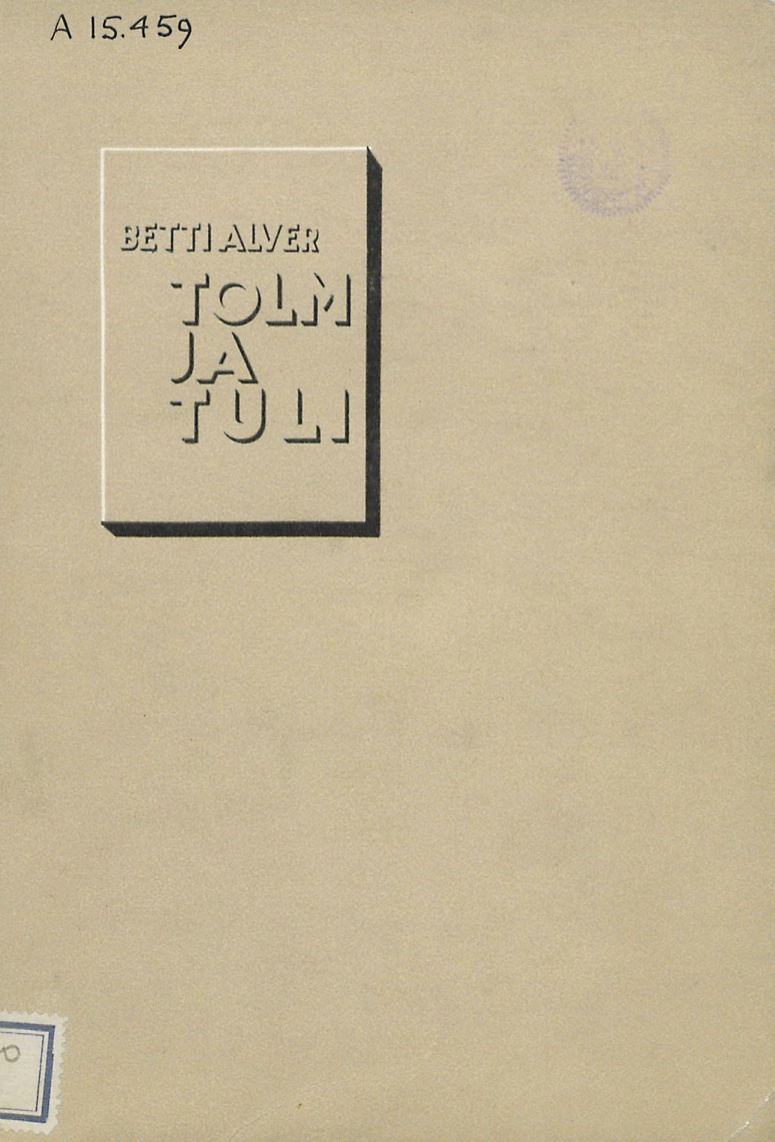What do you think?
Rate this book


Unknown Binding
Published January 1, 1936
Alver's true talent is reflected in the poetry to which she was dedicated from the early 1930s, publishing several poems in literary magazines and in “Dust and Fire” (1936), a collection of earlier poetry. It stood out with its artistic maturity and is, on the whole, a song of beauty and of the love of truth. – translation of the Estonian language synopsis.

THE DEMON OF FREEDOM
Remain humble in affirmation to others:
it is impossible to want our own destiny,
you be my guide in a journey
in the brownish steamy swamp.
Whatever battles are fought here,
still you admonish me: go by!
All my desires and loves are ashes,
as if my finger touches my chest.
No soldier will ever defeat you,
though your flesh is vermiculous and infirm
and your freedom from God's rivet.
Believing when you see you, all the doors will close,
but to you when he comes home
a longing heretic and a proud ascetic.
QUARANTINE
Even when a teenager, full of hot humility,
attacks a high fortress on the horizon,
as he finally believes he's coming home -
a mocking voice shouts at him, "Wait a minute, son!"
He who arrogantly wanted to win the last edge,
shamelessly transporting an ambulance,
to a body where noble defiance and lust ferment,
smearing tired traces of sulfur ointment.
In a suffocating sauna with bars on the window,
protective gloves on hands, covered faces
burning in the steam while heating the heater,
with cloth of fine linen, black and bloody.
And when a guard loosens the bolt from the prison door,
the road is finally free, free to hike for long,
thirsty, drinking the crisp breath of the winds,
he turns his heart from the whine of quarantine.
SONG OF THE WITCHES
Throw into the pot the wrath of claws,
henbane, bile, dandruff,
blood and werewolf meat -
come, blaze enough!
A straight path
leads past the goal,
the best bread is that
which is not eaten whole.
All of the evil
let us boil the dark red butter
transparent like wax
appears our poisonous flower.
The great is little
the cold is hot
we were left
with the heart of things.
In our path are enchanted worlds
and thunder runs,
and following us with frightened eyes
watching are the suns.
WITCH
Heavily the wax flows over the copper chandelier,
dim shadows in the mirror, my white substitute.
Laying on the waste bag, heat dissipated from the body,
bluish fingers on the chest, lips shuttered.
Neighbours, relatives are on all the wall edges,
uncle is drunk again, aunt has swollen legs.
On the stairs, beggar children eat honey and berries,
Some hobo is dumbly standing in the shadow of the door.
A tear from his eyes sneaked into the grass weakly.
Stupid! probably one day we'll meet in hell.
But if there is no comfort here in your gloomy mood,
I will come to you in the form of a white cat.
THE VIEWER OF GHOSTS
The child can only scream in horror
if he is struck by the fingertip of the skeleton,
in those cases, however, I tried to instill
the assumption that I'm a ghost myself.
During the moonlight I got out of bed, sweat on my forehead,
and I lurked in doors, fences,
that running into hiding near ghosts,
I would be afraid to scare them.
I'm crazy though! In the shadow of darkness
from my heart, which got used to it imperceptibly
with lemurs, the fearful fear fell.
But in the light of day, I am now overwhelmed with fear.
I don't think I belong to a human family anymore:
A haunting from another world will remain in my blood.
IN THE JEWISH CITY DISTRICT
The ghetto is shaken by a whistling blast,
house from house as if to cry for help,
the synagogue flashes angrily
like a rabbi muttering a curse.
The air passes through like a whistling nut
an urgent shout from all the burrows.
In front of three candles, a Talmud is browsed by a Jew,
another repairs an umbrella.
Stacks of bones in the yard pile up in a row,
Heaps of rags are sent flying ...
Against a window among the dusty flowers
the dark girl thinks thoughtfully.
A rich man looks on in his coat and braids*
as he, putting his finger to his lips,
observes a cut-off head on a platter,
which once belonged to someone named John.
*the Estonian word "palmik" translates as "braid", but it is presumably the Payot sidelocks of Orthodox Jews that is being referred to.